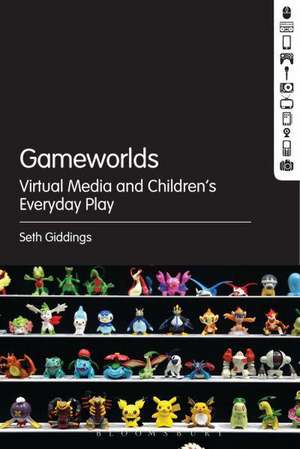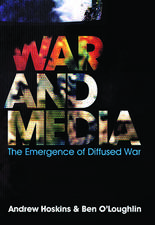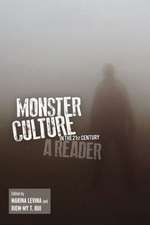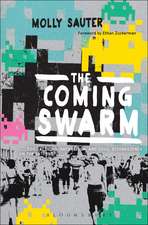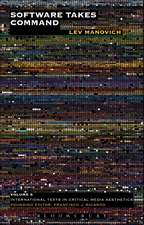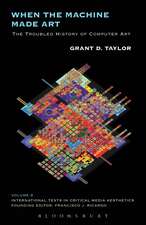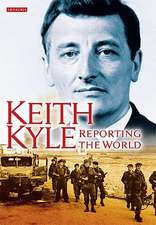Gameworlds: Virtual Media and Children's Everyday Play
Autor Programme Leader Seth Giddingsen Limba Engleză Hardback – 22 oct 2014
| Toate formatele și edițiile | Preț | Express |
|---|---|---|
| Paperback (1) | 255.58 lei 6-8 săpt. | |
| Bloomsbury Publishing – 18 mai 2016 | 255.58 lei 6-8 săpt. | |
| Hardback (1) | 713.29 lei 6-8 săpt. | |
| Bloomsbury Publishing – 22 oct 2014 | 713.29 lei 6-8 săpt. |
Preț: 713.29 lei
Preț vechi: 1026.93 lei
-31% Nou
Puncte Express: 1070
Preț estimativ în valută:
136.48€ • 142.89$ • 112.93£
136.48€ • 142.89$ • 112.93£
Carte tipărită la comandă
Livrare economică 05-19 aprilie
Preluare comenzi: 021 569.72.76
Specificații
ISBN-13: 9781623566326
ISBN-10: 1623566320
Pagini: 192
Ilustrații: 16 bw illus
Dimensiuni: 152 x 229 x 20 mm
Greutate: 0.41 kg
Ediția:New.
Editura: Bloomsbury Publishing
Colecția Bloomsbury Academic
Locul publicării:New York, United States
ISBN-10: 1623566320
Pagini: 192
Ilustrații: 16 bw illus
Dimensiuni: 152 x 229 x 20 mm
Greutate: 0.41 kg
Ediția:New.
Editura: Bloomsbury Publishing
Colecția Bloomsbury Academic
Locul publicării:New York, United States
Caracteristici
Provides an understanding of how people of all ages incorporate virtual technology into their play
Notă biografică
Seth Giddings is Associate Professor of Digital Culture & Design Winchester School of Art University of Southampton, UK.
Cuprins
1. Acknowledgements2. List of illustrations3. Introduction: gameworlds4. Chapter 1: Virtual and Actual Worlds5. Chapter 2: Virtual Media & Children's Everyday Play6. Chapter 3: Microethology: methods for studying gameworlds7. Chapter 4: Media Worlds8. Chapter 5: Soft Worlds: play with computers9. Chapter 6: Playgrounds: the material and immaterial in play10. Chapter 7: Real Worlds: realities, virtualities, and the protopolitics of play11. Bibliography
Recenzii
This is a methodologically rich and thoroughly engaging book. Giddings gives us insight into the profound agencies of children in the midst of our new media saturated, yet still very material, culture. More than this, thanks to Giddings, we can now look to our young bricoleurs for analytic advice on how to make sense of the increasingly complex strands of power, pleasure and materiality that make up contemporary social life.
Seth Giddings has long been one of the most astute observers of the complexities of digital play and this book offers a compelling, sophisticated look at gaming. Anchored in evocative analysis across a variety of 'gameworlds,' he beautifully shows of how everyday play lives are interwoven between the virtual and the material. This is a must read for anyone interested not only children and gaming, but media technology more broadly.
This timely study is at once specific in its ethnographic attention to the micro-detail of children's play and excitingly ambitious in its theoretical range. Seth Giddings connects the work of the Opies to contemporary game studies, and worries away productively at the complex overlap between the virtual worlds children fabricate in gardens and playgrounds and those they inhabit in digital games. He acknowledges pre-digital play cultures, and valuably posits post-digital play. All students of games, childhood, media and play should keep this book open on their desk.
This is an exciting and important book that challenges traditional notions of play and gaming, exploring as it does the liminal spaces occupied by play across online and offline spaces. Drawing on rich ethnographic data, Seth Giddings demonstrates how play that is embedded in digital worlds is rich, imaginative and crosses the boundaries between physical and virtual spaces in fluid and complex ways. Through close analysis of extended play episodes, Giddings argues convincingly that play is not dying in the technological age, and he challenges those who seek to dichotomise digital and non-digital play by suggesting that the latter is more traditional and thus more 'worthy' in some way. Gameworlds is a book that will set the agenda for anyone interested in the future of play and should be read by policy-makers, researchers, students, teachers, playworkers and parents alike, all of whom will find much of value in its pages.
Seth Giddings has long been one of the most astute observers of the complexities of digital play and this book offers a compelling, sophisticated look at gaming. Anchored in evocative analysis across a variety of 'gameworlds,' he beautifully shows of how everyday play lives are interwoven between the virtual and the material. This is a must read for anyone interested not only children and gaming, but media technology more broadly.
This timely study is at once specific in its ethnographic attention to the micro-detail of children's play and excitingly ambitious in its theoretical range. Seth Giddings connects the work of the Opies to contemporary game studies, and worries away productively at the complex overlap between the virtual worlds children fabricate in gardens and playgrounds and those they inhabit in digital games. He acknowledges pre-digital play cultures, and valuably posits post-digital play. All students of games, childhood, media and play should keep this book open on their desk.
This is an exciting and important book that challenges traditional notions of play and gaming, exploring as it does the liminal spaces occupied by play across online and offline spaces. Drawing on rich ethnographic data, Seth Giddings demonstrates how play that is embedded in digital worlds is rich, imaginative and crosses the boundaries between physical and virtual spaces in fluid and complex ways. Through close analysis of extended play episodes, Giddings argues convincingly that play is not dying in the technological age, and he challenges those who seek to dichotomise digital and non-digital play by suggesting that the latter is more traditional and thus more 'worthy' in some way. Gameworlds is a book that will set the agenda for anyone interested in the future of play and should be read by policy-makers, researchers, students, teachers, playworkers and parents alike, all of whom will find much of value in its pages.
